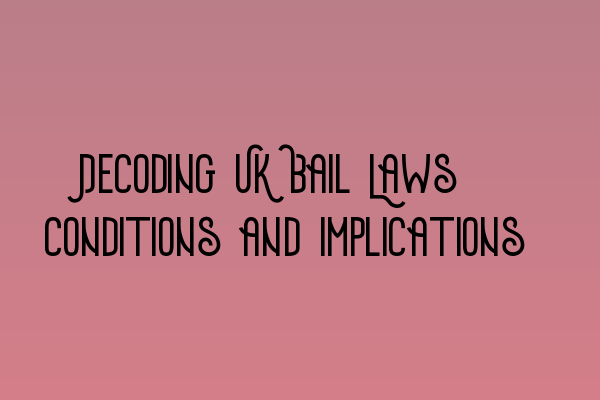Decoding UK Bail Laws: Conditions and Implications
When it comes to the criminal justice system in the United Kingdom, one essential aspect is the concept of bail. Bail allows individuals accused of a crime to be released from custody while awaiting trial. However, it is not as straightforward as it may seem. This blog post will decode the UK bail laws, covering the conditions attached to bail and their implications.
Understanding Bail Conditions
When a person is granted bail, certain conditions are imposed to ensure their compliance with the legal proceedings and to minimize the risk of them fleeing or committing further offenses. These conditions can vary depending on the severity of the crime, the individual’s criminal history, and the court’s assessment of the risks involved.
Some common bail conditions include:
- Reporting: The accused may be required to report regularly to a police station or a designated officer.
- Residence: A specific address may be specified where the accused must reside during the bail period.
- Curfew: A time limit may be imposed, restricting the accused’s movements during certain hours.
- Surrender of travel documents: Passports and other travel documents may need to be surrendered to prevent the accused from leaving the country.
These conditions aim to strike a balance between the individual’s rights and the need to ensure their presence at trial. They are tailored to the specific circumstances of each case and may be modified or revoked based on the court’s discretion.
Implications of Bail Conditions
The conditions attached to bail have significant implications for individuals awaiting trial:
- Freedom: Bail allows individuals to remain free while their case is ongoing, minimizing the impact on their personal and professional lives.
- Compliance: Adhering to the bail conditions is crucial to avoid violating the terms of release, which may result in the revocation of bail and the person being held in custody.
- Restrictions: Certain conditions, such as curfew or residence requirements, may restrict an individual’s movements and lifestyle.
- Risks: Failure to comply with bail conditions can lead to additional charges or can be considered as evidence of guilt during the trial.
It is essential for individuals on bail to fully understand and comply with the conditions imposed to avoid any adverse consequences.
Conclusion
Bail is a crucial aspect of the UK criminal justice system, allowing individuals accused of crimes to await trial outside of custody. Understanding the conditions attached to bail and their implications is vital for both accused individuals and their legal representatives.
For more information on related topics, you can check out the following articles:
- Legal Representation for Delaware LLCs in the UK: Expert Advice
- Ensuring Ethical Business Practices: Delaware’s Code of Conduct
- Legal Challenges for UK Businesses in the U.S.: Strategies for Overcoming Hurdles
- Legal Challenges for UK Businesses in the U.S.: Strategies for Overcoming Hurdles
- SQE Exam Prep: Essential Study Materials for Aspiring Solicitors
For expert legal advice on bail laws and representation, please contact SQE Criminal Law & Practice Law UK.
